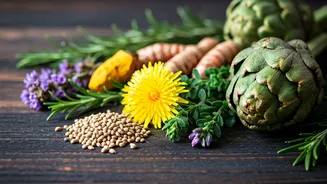Introduction to Fatty Liver
Fatty liver disease, a growing concern globally, stems from the excessive accumulation of fat within liver cells. While alcohol consumption can contribute,
non-alcoholic fatty liver disease (NAFLD) is also prevalent, often linked to lifestyle factors. Addressing this condition early is crucial to prevent further complications like liver inflammation and potential damage. This article focuses on harnessing the potential of natural herbs to support liver health.
Milk Thistle's Power
Milk thistle, celebrated for its liver-protective properties, contains silymarin, an active compound that acts as an antioxidant. Silymarin shields the liver from toxins and aids in regenerating damaged cells. Studies suggest milk thistle can improve liver function in individuals with NAFLD, making it a valuable addition. Consider milk thistle supplements or teas, but always consult with a healthcare professional to determine the appropriate dosage for your condition and ensure it aligns with any existing medications or health conditions.
Turmeric's Anti-Inflammatory Action
Turmeric, a staple in Indian cuisine, boasts curcumin, a compound known for its potent anti-inflammatory effects. Curcumin helps reduce liver inflammation, a key factor in fatty liver disease. It also has antioxidant properties, further protecting liver cells. While adding turmeric to your diet can be beneficial, consider taking curcumin supplements, particularly those with added piperine (black pepper extract), to boost absorption. Always consult your doctor before starting any new supplement regimen.
Dandelion's Detoxifying Role
Dandelion, often seen as a weed, possesses potent liver-cleansing properties. It promotes bile production, aiding in the removal of waste and toxins from the liver. Dandelion can help reduce fat accumulation and inflammation in the liver. It's available as a tea, supplement, or even added to salads. Embrace the gentle detoxifying power of dandelion, but always start with a moderate amount to gauge your body's response.
Artichoke's Liver Support
Artichoke, a culinary delight, contributes to liver health through its antioxidant and choleretic (bile-stimulating) effects. It can help improve liver function and reduce fat buildup. Artichoke extract is available in supplement form, and consuming artichokes regularly in your diet is another way to benefit. Including artichoke in your meals could be a delicious way to support your liver.
Ginger's Anti-Fatty Effects
Ginger, a common spice, contains gingerol, which has anti-inflammatory and antioxidant properties that can benefit the liver. Research suggests ginger may help reduce fat accumulation in the liver. Enjoy ginger in teas, add it to your cooking, or opt for ginger supplements. The warming and flavorful ginger is a versatile addition to your daily routine, but it's important to monitor its effects and adjust accordingly.
Licorice Root Benefits
Licorice root contains glycyrrhizin, which possesses anti-inflammatory and antioxidant properties. It can aid in protecting the liver from damage and potentially improve liver enzyme levels. However, licorice can affect blood pressure and interact with certain medications. Therefore, it is important to use licorice root with caution and after consulting with a healthcare professional to ensure it is safe for you.
Schisandra Berry's Shield
Schisandra berry, a traditional Chinese medicine, contains lignans that have liver-protective effects. They can help protect the liver from toxins and promote liver cell regeneration. Schisandra berries are available as supplements or teas. Explore the benefits of this ancient herb, but be mindful of its potential effects and consult with your doctor before incorporating it into your routine.
Bupleurum's Liver Aid
Bupleurum, frequently used in traditional Chinese medicine, possesses anti-inflammatory properties that can support liver health. It may aid in reducing liver inflammation and protecting liver cells. Bupleurum is often combined with other herbs in traditional formulations. Consult an expert to understand its potential benefits and how it can fit into your health plan.
Green Tea's Antioxidants
Green tea is rich in antioxidants, particularly catechins, which may help protect the liver from damage caused by free radicals. Studies indicate that green tea consumption may improve liver function in individuals with NAFLD. Enjoy green tea regularly, but moderation is key, and consult with a doctor to address any concerns. Integrating green tea into your daily routine could be a refreshing way to support your liver's health.













